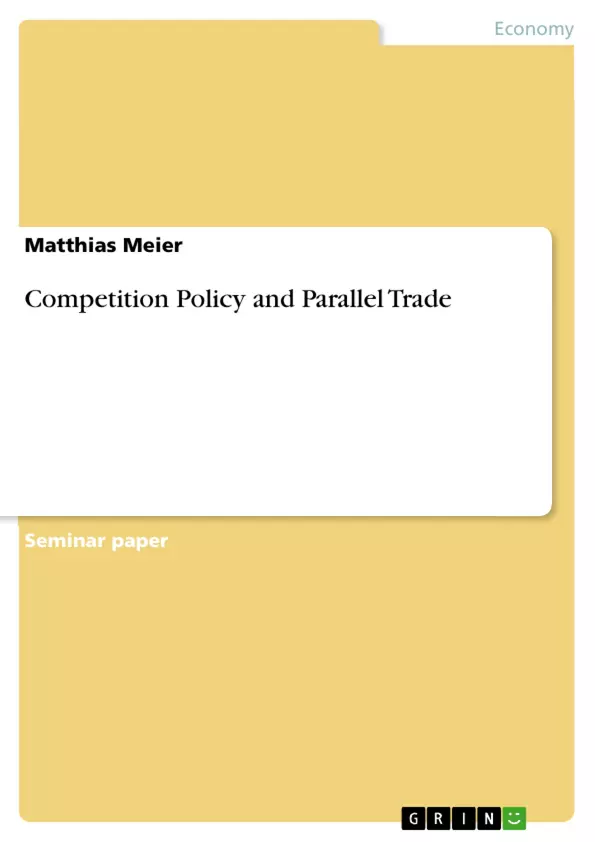Today’s highly competitive environment is characterised by an internationalisation of business activities. More and more small and medium enterprises take the first step and operate globally beyond national boundaries. Huge companies aim to concentrate activities due to high cost pressures etc. Mergers and Acquisition of “Global Players” become more and more important. In such an environment, a sophisticated competition law is indispensable.
Competition law ensures that economic operators do not “prevent, distort or restrict competition” by running their businesses. Moreover, it inhibits monopolists in abusing their dominant market position in order to protect potential competitors and / or customers. According to Craig / de Burca, competition law has three objectives. It should (1) increase the efficiency, (2) protect consumers and smaller companies and (3) continue the creation of a single European market.
Chapter 2 of this assignment addresses Question 1 and deals with Treaty Articles which are used to stop undertakings hindering parallel trade. Moreover, examples of the application and interpretation of the provisions by the European Court of Justice (ECJ) are given. Chapter 3 answers Question 2 and deals with a case of two companies which are investigated for infringements by the European Commission. At the end, a possible decision of the Commission is anticipated.
Inhaltsverzeichnis (Table of Contents)
- Introduction
- Competition Law
- Definition of parallel imports
- Relevant EC Law
- The Treaty Articles
- The 'de Minimis' Principle
- Interpretation and application of Treaty Articles
- Weltbummel AG and Bouncy Ball Ltd.
- The Case
- Application of Article 81 to the case Weltbummel / BBL
- The possible outcome
- Conclusion
Zielsetzung und Themenschwerpunkte (Objectives and Key Themes)
This assignment examines the role of competition law in regulating parallel trade within the European Community. The paper analyzes the legal framework governing parallel imports and explores the application of key Treaty Articles in preventing undertakings from hindering this trade. Furthermore, a case study of two companies investigated for potential infringements by the European Commission provides a practical illustration of competition law in action. The ultimate goal is to understand how competition law fosters a single European market by promoting fair competition and protecting consumers.
- Parallel trade and its economic implications
- Relevant EC law and its application to parallel imports
- The impact of Treaty Articles on restricting trade
- Case study analysis of potential competition law infringements
- The role of competition law in fostering a single European market
Zusammenfassung der Kapitel (Chapter Summaries)
- Introduction: This chapter provides an overview of the increasingly competitive global business environment and highlights the importance of competition law in regulating economic activities. It emphasizes the key objectives of competition law, including efficiency, consumer protection, and the creation of a single European market.
- Competition Law: This chapter defines parallel imports and explores the legal framework governing them. It examines the key Treaty Articles, including Article 28, which prohibits quantitative restrictions on imports, and Article 30, which outlines exceptions to these restrictions. Furthermore, it discusses the interpretation and application of these articles by the European Court of Justice.
- Weltbummel AG and Bouncy Ball Ltd.: This chapter presents a case study involving two companies under investigation for potential competition law infringements. It analyzes the application of Article 81 to the case, examining the potential consequences for the companies involved.
Schlüsselwörter (Keywords)
The main keywords and focus topics of the text are competition law, parallel trade, European Community, Treaty Articles, quantitative restrictions, parallel imports, Article 28, Article 30, European Court of Justice, case study, and the single European market. The text delves into the legal framework surrounding parallel imports and its impact on fostering a competitive and integrated European economic environment.
Frequently Asked Questions
What is parallel trade in the European Union?
Parallel trade involves importing goods from one EU country to another through channels outside the manufacturer's official distribution network, taking advantage of price differences.
What are the main objectives of EU competition law?
The objectives are to increase economic efficiency, protect consumers and smaller companies, and support the creation of a single European market.
How does the ECJ interpret parallel imports?
The European Court of Justice generally views restrictions on parallel trade as a violation of competition law, as they hinder the free movement of goods.
What is the 'de Minimis' principle?
It is a rule stating that competition laws do not apply to agreements that have only a negligible effect on the market and competition.
What is Article 81 of the EC Treaty?
Article 81 prohibits agreements between undertakings that prevent, restrict, or distort competition within the single market.
Why is competition law essential for global players?
It ensures a fair playing field, prevents monopolies from abusing their position, and protects international trade from unfair restrictions.
- Quote paper
- Matthias Meier (Author), 2006, Competition Policy and Parallel Trade, Munich, GRIN Verlag, https://www.grin.com/document/52381



